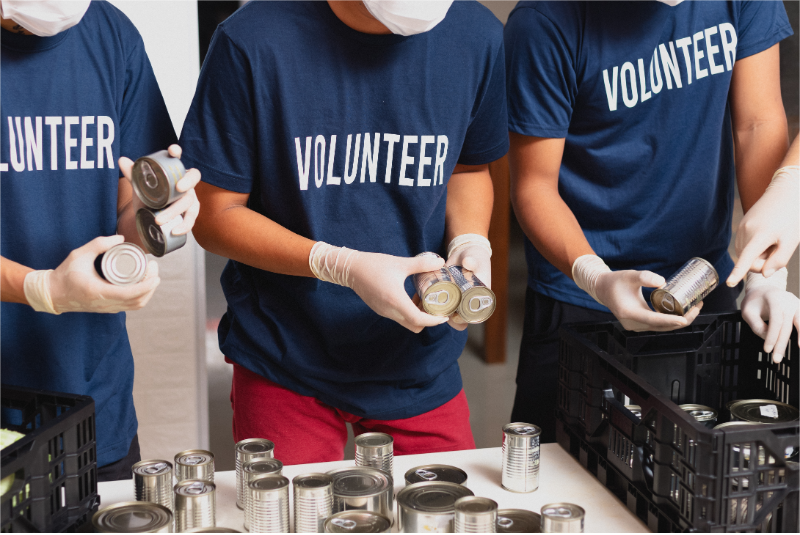Imagine this: You're at a bustling event filled with laughter and excitement, surrounded by people fully immersed in various games. The energy is palpable. This isn't just any social gathering, it's a fundraising event. Unexpected, isn't it? But that's the magic of introducing games into fundraising efforts—it's a masterstroke that can change the entire dynamics of an event.
Fundraising, a vital tool for supporting numerous causes, can sometimes struggle to capture public interest. People often associate it with seriousness and heavy topics, and this can be intimidating or off-putting to potential supporters. But what if we could change that perception? What if fundraising was synonymous with fun, excitement, and community?
That's where games come in. A well-designed game can draw crowds, boost participation, and generate that vital spark of enthusiasm, all while serving the greater purpose of raising funds. In this blog, we'll explore how you can turn a fundraising idea and fundraising strategy into fun-raising, showcasing a variety of games that can not only engage your audience but also significantly contribute to your noble cause. Ready to make a difference? Let's get started!

Understanding the Basics of Fundraising Games
Fundraising games are essentially playful activities integrated into a fundraising event to engage attendees and spur them into action, namely donating to the cause at hand. They're more than just entertainment—these games serve as a strategic tool to break the ice, create a friendly atmosphere, and promote a spirit of giving.
The importance of fundraising events lies in their capacity to connect people and the cause. Fundraising is not just about asking for money; it's about telling a story, sharing the mission behind the cause, and inspiring people to contribute. Sometimes, a direct appeal for funds can be off-putting or might not engage potential donors as effectively. That's where fundraising games come in—they provide a less formal, more engaging way to involve the community. They can bring joy and excitement to an event, making attendees more open to hearing about the cause and more likely to donate.
Typical Objectives of Fundraising Games and Fundraising Events
- To Entertain: A good game is fun and engaging. It offers a break from more serious discussions about the cause and gives attendees an opportunity to relax and enjoy the event.
- To Educate: Fundraising games can be tailored to shed light on the cause. For instance, a game at a wildlife conservation fundraiser might include trivia about endangered species. This way, attendees can learn more about the cause in an interactive manner.
- To Encourage Donations: Fundraising games can prompt donations in a variety of ways. Entry fees, pledges based on performance (e.g., donating a certain amount for every point scored), and auctions are all effective methods to generate funds.

The Benefits of Fundraising Games
Fundraising games hold enormous potential and can bring a myriad of benefits to your fundraising efforts. Here's a closer look at some of these advantages.
1. Increased Participation
People love games—it's a universal truth! When you advertise a fundraiser that promises fun games, you're likely to attract a larger crowd. The opportunity to participate in an enjoyable activity while supporting a worthy cause can be a major draw.
2. Community Engagement
Fundraising games can turn passive attendees into active participants. They break down barriers, get people talking, and foster a sense of community. Games encourage interaction and collaboration, which can lead to stronger connections and a heightened sense of camaraderie among participants.
3. Entertainment Value
Let's face it; traditional fundraising events can sometimes be dry. Integrating games can add a layer of excitement and entertainment to the event. This helps keep attendees engaged and enhances their overall experience, making them more likely to stay longer and contribute more.
4. Memorable Experience
Games make events memorable. When attendees look back, they'll remember the laughter, the competition, and the camaraderie more than they'll remember a speech. A memorable event is likely to be talked about, shared on social media, and can potentially attract a larger audience for future fundraisers.
5. Increase in Funds
This might be surprising, but fundraising games can often raise more money than traditional methods. Games can be designed in numerous ways to generate funds: from entrance fees and team sponsorships to winning prize donations. Attendees are more likely to contribute when they are having fun, and this can lead to greater fundraising success.

Selecting the Right Fundraising Games
Choosing the right games for your fundraising event can significantly influence its success. But with so many games to choose from, how do you pick the ones that best fit your event? Below, we'll cover some key factors you need to consider.
1. Audience Age
The age of your attendees is an important factor to consider. If you're hosting a family-friendly event, you'll want games that are suitable for all ages. For events targeting adults, more complex games could be a good fit. Always ensure that your games are appropriate and engaging for your target audience.
2. Event Size
The scale of your event will also influence your choice of games. For larger events, games that can accommodate multiple players or even multiple games happening simultaneously could be ideal. Smaller events might benefit from more intimate, cooperative games.
3. Location
The venue of your event can dictate the type of games you choose. Indoor venues might be suited to board games, trivia, or auctions, while outdoor venues offer opportunities for physical activities, like relay races or obstacle courses.
4. Overall Fundraising Goal
The amount of money you aim to raise can influence your game choice. If you're aiming for a high target, consider games that encourage larger donations—like charity auctions. Smaller goals might be achievable through simpler games with fixed costs, like a raffle or bingo. So, it is important to set the fundraising goal before planning.
5. Aligning Games with the Cause
Last, but not least, it's beneficial if the game theme aligns with the cause you're supporting. For instance, a trivia game for a literacy program fundraiser could include questions related to literature. This not only entertains but also educates attendees about the cause.
Choosing the right games involves careful consideration of various factors, but ultimately it boils down to knowing your audience and aligning the games with your cause and event logistics. The right games can enhance your fundraising event, making it more engaging, enjoyable, and successful. Remember, the goal is not just to raise funds but also to provide a memorable experience for all attendees, encouraging them to continue supporting your cause in the future.

Top Ten Fundraising Games
There are countless fundraising games you can choose from, but here are ten tried-and-true favorites that have proven to be successful and enjoyable:
1. Charity Auction
A charity auction is an excellent charity event. Participants bid on items donated by local businesses or supporters. The highest bidder wins the item, and the funds go to the charity. Charity silent auction or live auction not only raises funds but also creates a buzz and excitement.
2. Trivia Night
Teams compete in a quiz-style game with categories that can be tailored to your cause. Entry fees generate revenue, and you can also sell food and drinks to raise money.
3. Sponsored Walk/Run
Participants collect pledges from friends and family to complete a walk or run. This promotes healthy living and community engagement, along with raising funds.
4. Raffle
Sell raffle tickets for a chance to win prizes. This simple, cost-effective game can generate a significant profit if you have an attractive prize.
5. Pie Throwing
Participants pay to throw pies (or any safe, messy substance) at volunteers, often well-known figures within the community. It's a fun, light-hearted game that draws in a crowd and inspires laughter.
6. Bingo Night
Classic and always popular, bingo nights are easy to organize. Sell bingo cards and offer a portion of the proceeds as a prize, with the remainder going to your cause.
7. Guessing Game
Participants pay to guess the number of items in a container, with the closest guess winning a prize. This is a low-cost, easy game that can attract lots of participants.
8. Talent Show
Charge an entry fee for participants to showcase their talents, and sell tickets to the show. This game not only raises funds but also offers a platform for individuals to share their talents.
9. Casino Night
Organize a faux-casino night where participants play for chips instead of cash. The chips can be purchased, and at the end of the night, they can be exchanged for prizes.
10. Duck Race
Sell numbered rubber ducks and release them into a local river. The first duck to reach the finish line wins a prize for the person who bought it. This game is engaging, visually fun, and can draw a large crowd.
These are just a few examples of fundraising games that can add a fun twist to your event. The key is to choose games that align with your cause, fit your audience, and have a proven track record of entertaining attendees while effectively raising funds.

How to Promote Your Fundraising Games
Promoting your fundraising games is crucial to ensure a good turnout and maximize the funds raised. Here are some strategies to attract a large audience and make your games stand out.
1. Social Media Promotion
Social media platforms like Facebook, Twitter, and Instagram are excellent tools for promoting your event. You can create event pages, share posts about the games, and use hashtags to expand your reach. Consider creating engaging content like videos or images of the games, testimonials from past participants, or behind-the-scenes peeks at your preparation process.
2. Local Media Outreach
Reach out to local newspapers, radio stations, and TV channels. Send a press release detailing your event, the cause it supports, and the unique games it will feature. Getting coverage in local media can significantly increase visibility and draw a larger crowd.
3. Partnerships with Local Businesses
Partner with local businesses for mutual benefits. They could sponsor your games, donate prizes, or help promote the event to their customers in exchange for visibility and promotion at your event.
4. Unique Selling Points
Make your games stand out by emphasizing what makes them unique. Maybe you've adapted a classic game in a creative way or developed a completely new game. Highlight these unique selling points in your promotional materials to pique people's interest.
5. Interesting Prizes
Offering interesting and valuable prizes can encourage more people to participate in your games. Consider seeking prize donations from local businesses or individuals to increase the appeal of your games.
6. Engaging Presentations
The way you present and describe your games can make a big difference. Use compelling descriptions, high-quality images, and engaging storytelling to draw people in and get them excited about your games.

Ensuring Successful Execution of Fundraising Games
Once you've selected your games and promoted your event, the next step is to ensure successful execution. This involves meticulous planning, active engagement during the event, and thoughtful post-game actions. Let's dive in.
1. Logistics Event Planning
The importance of careful logistics planning cannot be overstated. This involves securing your venue and ensuring it is properly prepared for your games. Depending on your location and the nature of your event, you may need to secure specific permits. Also, make sure you have all the game materials you'll need. It's advisable to create a detailed checklist and timeline to ensure nothing falls through the cracks.
2. Engaging Participants
Keep your attendees engaged during the event. This could be through a charismatic game host, interactive activities, or live performances in between games. Actively encourage donations, reminding participants about the cause and how their contributions can make a difference.
3. Expressing Gratitude
After the event, don't forget to express your gratitude to those who attended. This could be in the form of thank-you notes, social media shout-outs, or even personalized emails. People like to be appreciated, and this gesture could go a long way in securing their support for future events.
4. Sharing Success
Lastly, share the success of your event publicly. This could include the total amount raised, the number of participants, or even stories of how the funds will be used. This not only provides closure to this event but also sets the stage for the next fundraising event. Remember to share these updates with local media and on social media platforms.

Leveraging Online Fundraising Platforms
In today's digital era, online fundraising platforms have become increasingly popular as they provide a convenient way to reach a global audience and simplify the donation process. One such platform is *spotfund, a free online fundraising tool that can greatly enhance your fundraising efforts.
What is *spotfund?
*spotfund is an online fundraising platform that allows individuals and organizations to create fundraising campaigns for causes they care about. What sets *spotfund apart is its commitment to being free, only charging the standard credit card processing fee. This ensures that more of the funds raised go directly to the cause.
Using *spotfund for Your Fundraising Games
- Create a Campaign: Start by creating a fundraising campaign on *spotfund. Clearly explain the cause you're raising money for, your fundraising goal, and details about the games. Remember to tell a compelling story about your cause to draw people in and motivate them to contribute.
- Share on Social Media: *spotfund integrates seamlessly with social media platforms. Share your *spotfund campaign on Facebook, Twitter, Instagram, and other social networks. This can help you reach a wider audience and attract more donations.
- Update Your Campaign: Keep your campaign page updated with news about your games—share pictures, post scores, announce winners, etc. This not only keeps donors engaged but also encourages more people to donate.
- Accept Donations: *spotfund makes it easy for supporters to donate using their credit card or mobile wallet such as Apple Pay. This ensures a seamless experience for your donors, encouraging them to contribute.
- Thank Your Donors: Utilize the *spotfund dashboard to send personalized thank-you emails to your donors. This feature allows you to acknowledge each contribution individually, fostering a more personal connection with your supporters and enhancing their engagement with your cause.
By using an online fundraising platform like *spotfund, you can enhance your reach, simplify the donation process, and ensure more of the funds raised go to your cause. It's an effective tool to maximize the success of your fundraising games.
Create your fundraising events and campaign with *spotfund today!

